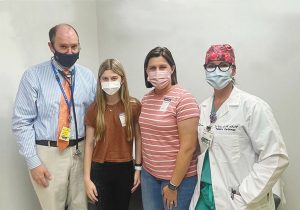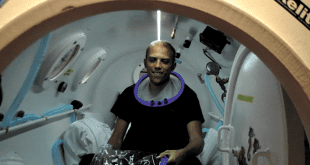
Erin Ambrose knew the day would come. The day she would once again watch her daughter, Hailey, be wheeled into an operating room so that a team of cardiac specialists could repair her heart.
“Thankfully instead of another open-heart surgery followed by weeks of recovery like Hailey’s first procedure at just 5 months old, this time her heart was repaired with a new, innovative device that allowed her to be back home the next day,” Ambrose said.
Hailey, now age 13, was born with tetralogy of Fallot, a common but complex congenital heart condition that is a combination of four different heart defects. All patients born with this diagnosis require initial open-heart surgery during infancy to correct the defects, and many, including Hailey, need additional cardiac procedures later in childhood or during adulthood to repair or replace their pulmonary valve.
In July, St. Joseph’s Children’s Hospital Pediatric Interventional Cardiologist Dr. Jeremy Ringewald successfully replaced Hailey’s pulmonary valve during a minimally invasive procedure using the new Alterra Adaptive pre-stent. Dr. Ringewald is the first in Tampa Bay and among a select few in the United States to implant the Alterra pre-stent, which is used in conjunction with the Edwards SAPIEN 3 transcatheter valve. “Transcatheter valves are not new, but not always an option because the shape of the area where the valve needs to go – the right ventricular outflow tract – is too large or irregular,” said Dr. Ringewald. “The Alterra allows for a higher number of patients to be candidates for transcatheter valve replacement because it standardizes the shape of the pulmonary valve opening.” The Alterra Adaptive pre-stent is a self-expanding, partially covered stent shaped like an hourglass. It is designed to fill and reduce the size of large right ventricular outflow tracts and provides a landing zone for the Edwards SAPIEN 3 transcatheter heart valve.
As a regional leader in cardiovascular care, the Patel Children’s Heart Institute at St. Joseph’s Children’s Hospital is committed to continuously broadening treatment options for its congenital heart patients.
“With this innovative technology, thousands of patients needing pulmonary valve replacement will be able to avoid open-heart surgery now,” Dr. Ringewald adds.
During Hailey’s procedure, Dr. Ringewald threaded a catheter through a blood vessel in her leg and guided the catheter by fluoroscopy to the location of her pulmonary valve. The Alterra pre-stent was deployed through the catheter and positioned and implanted, followed by the replacement heart valve.
While she may need a new valve again later in life, the pre-stent is now a permanent structure within Hailey’s heart.
The Patel Children’s Heart Institute at St. Joseph’s Children’s Hospital is home to the largest comprehensive congenital heart disease program in West Central Florida and its cardiac physicians perform hundreds of procedures each year to treat congenital and acquired heart conditions in children of any age, including newborns. A partnership between St. Joseph’s Children’s Hospital and UPMC Children’s Hospital of Pittsburgh provides families across Florida with unprecedented access to the highest level of pediatric heart care available. Together, they provide highly specialized cardiovascular care for patients ranging from babies in the womb to adults with congenital heart disease.
 Central Florida Health and Wellness Magazine Health and Wellness Articles of the Villages
Central Florida Health and Wellness Magazine Health and Wellness Articles of the Villages


